Most of us feel nervous before speaking in public, making a big life decision, sitting for an exam, or handling an important project at work. Feeling anxious in such situations is completely normal — it’s just your body’s way of preparing for a challenge.
But when that anxiety becomes overwhelming and starts interfering with your everyday life, it may be more than just temporary stress.
So how do you know if you or someone you care about is dealing with an anxiety disorder?
In this post, we’ll explore:
-
What anxiety disorder really means
-
How to recognize the signs in yourself or others
-
What you can do to manage or support someone with anxiety
What Is Anxiety?
Anxiety is the feeling of fear, worry, uneasiness, or nervous tension — often triggered by stressful events or the anticipation of future challenges.
It becomes problematic when:
-
The fear is out of proportion to the actual situation
-
It starts to affect your relationships, work, or daily activities
-
You feel anxious even when there’s no real reason to be
In simple words, when your mind reacts to small or routine situations with extreme stress or fear, it may be a sign of an anxiety disorder.
What Is an Anxiety Disorder?
An anxiety disorder occurs when the feelings of fear or worry become chronic, excessive, and difficult to control. It is not just “being stressed out” — it’s a recognized mental health condition that often requires proper diagnosis and care.
Unlike everyday stress, anxiety disorder does not go away on its own and may even get worse over time if left untreated.
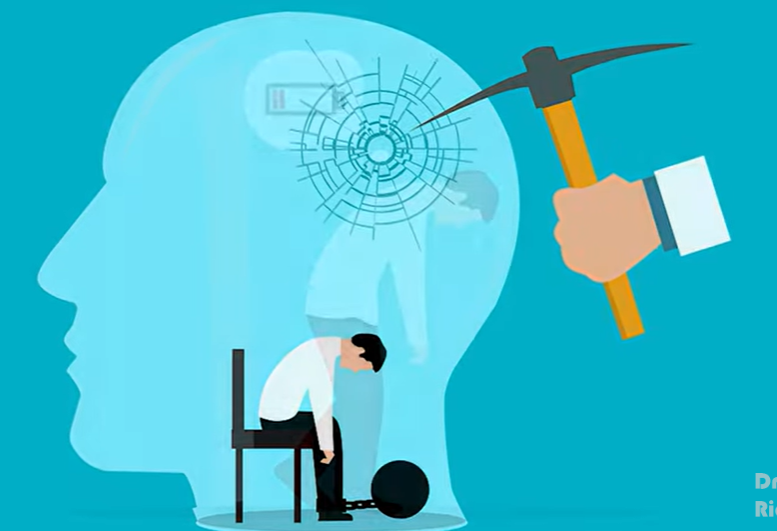
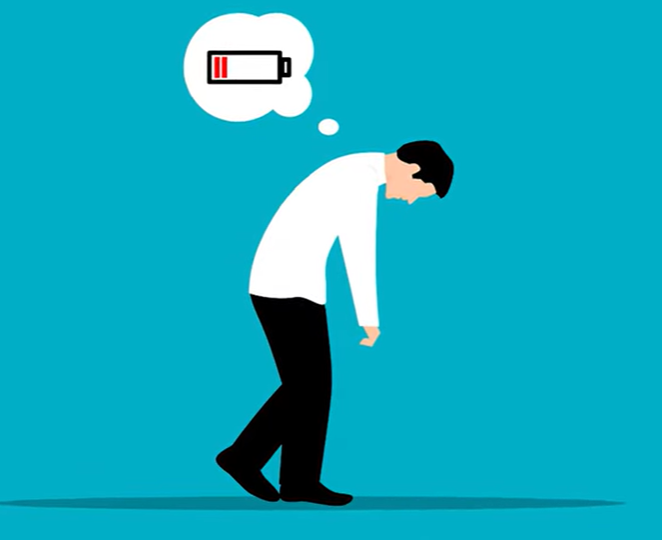
Causes of Anxiety Disorders
Now why does this happen?
There are many causes of anxiety disorders.
Genetics: In many families, anxiety disorder runs, and this happens due to genes. The genes for that disorder are present in that family itself and they keep running continuously.
Stress: If someone has experienced some acute, emotional stress in life.
Like, he has suffered some major mental trauma, or his loved one has died, or he has met with an accident, has been abused in some way, or a major emotional burden has fallen on the children, then they develop anxiety disorder later on.
How Common is Anxiety Disorder?
If we talk about how common is anxiety disorder?
Anxiety disorder is seen in roughly one-third (1-3rd) population of USA, in adults.

Not just in adults, anxiety disorder is slowly becoming more common in children too.
Generalized Anxiety Disorder
First of all we will talk about generalized anxiety disorder. If someone around you or you yourself are constantly worried, if we observe 24 hours a day, whenever you are awake, most of the time the person is stressed, afraid, or stressed about something or the other.
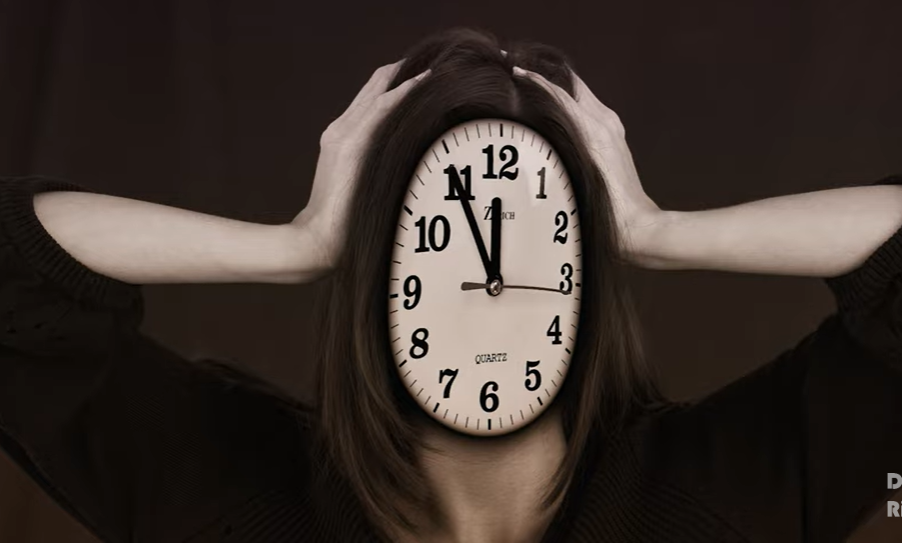
If we talk about the whole month, there is tension for more than 20 days in a month. If we talk about a year, there is stress for more than 300 days. There is stress in every small situation.
Which situation is stressful?
It seems that our health is deteriorating, our family’s health is deteriorating, it seems that our relations with people are deteriorating,
how do we deal with society?, how do we work in our workplace?, how do we handle small tasks?
Situations, if this happens, what should we do?, if this happens, what should we do? etc.

So, if every simple situation in life seems very challenging, scary to you, then you suffer from generalized anxiety disorder.
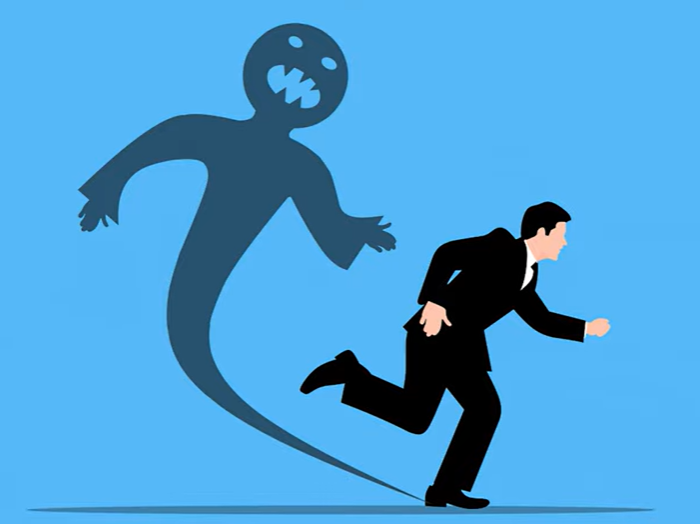
You are always living in the field of tension, fear, stress.
Constant tension, constant fear will interfere with your social life, work life, school life for children and their interactions with people will get poor.
Symptoms of Generalized Anxiety Disorder
Let us know about its symptoms, meaning how does the patient feel?
1. Restlessness: He will always have the feeling of restlessness, means he has never had a smooth feeling. A restlessness will remain, there will be a feeling of being on edge, if I do something or something is going wrong, I should fix it.
2. Constant worried: There will be constant worry, worry, the same situation will remain in the mind.
A feeling of stress or fear will remain in the mind for that.
3. Insomnia: There will be trouble in falling asleep, if you lie down, then it does not end. And if you fall asleep, then it is too much and you do not feel like getting up.
4.Fatigue: There will be low energy in the body, easy fatigue. Meaning, I thought so much, there must have been so much tension that my mind started getting tired.
Now I don’t feel like getting up, I don’t feel like talking to anyone, I don’t feel like avoiding people, I feel like ignoring them.
5. Muscular weakness: I felt a strange kind of tension in my muscles, as if my whole body was tired, there was a pull in my whole muscle. And I don’t feel any energy.
6. Irritability: I always felt irritability, irritation. If someone says something normal, you get angry because there is so much tension and fear in your back of mind that you get angry and irritated at every little thing.
7. Lack of Concentration:
And you don’t feel like doing anything. Your concentration is so low that if you ever try to concentrate on something, your mind gets distracted.
8.Irritation: The mind gets distracted by some particular thing and starts thinking about something else. Even before you start doing that work, your mind starts worrying that if this happens then this will happen. If this doesn’t happen then this will happen.
And if this doesn’t happen then what will I do? If this makes things worse then what will I do next, then how will I handle this whole situation. Because of this I don’t feel like doing any work.
All these symptoms persist, they are continuous, you worry everyday. And if this worry has been going on for 6 months continuously, your day to day life is hampered.
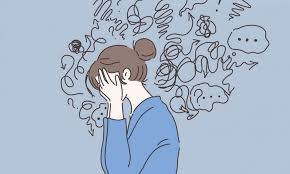



If you feel stressed and struggling with yourself, then there is a very high possibility that you are suffering from a generalized disorder.
Panic Attack
Panic attacks are anxiety attacks.
1. Sudden Anxiety Attack: People who get panic attacks, will get sudden attacks again and again, without any expectation.
2. Increased Heart Rate: In that attack, the heart rate of the victim will increase a lot.
3.Sweating: The whole body will start sweating.
4.Intense Fear: The patient will feel intense fear, very much afraid.
5.Tremors: In this situation, the patient’s hands will start trembling.
6. Speechlessness: The patient will not be able to utter a word.
7.Fear of Death: The patient will feel as if he will die. Meaning I will not be able to get out of this scenario, it will absolutely take over my life, it is so scary.
8. Breathlessness: And that person will start having trouble breathing. Choking sensation will start coming, it will feel like someone has placed a heavy object in the mouth.
These are so scary and troublesome that people who have had a panic attack fear that they might get a panic attack again.
They start trying to avoid that whole scenario, situation, or the thing due to which they were scared or had a panic attack.
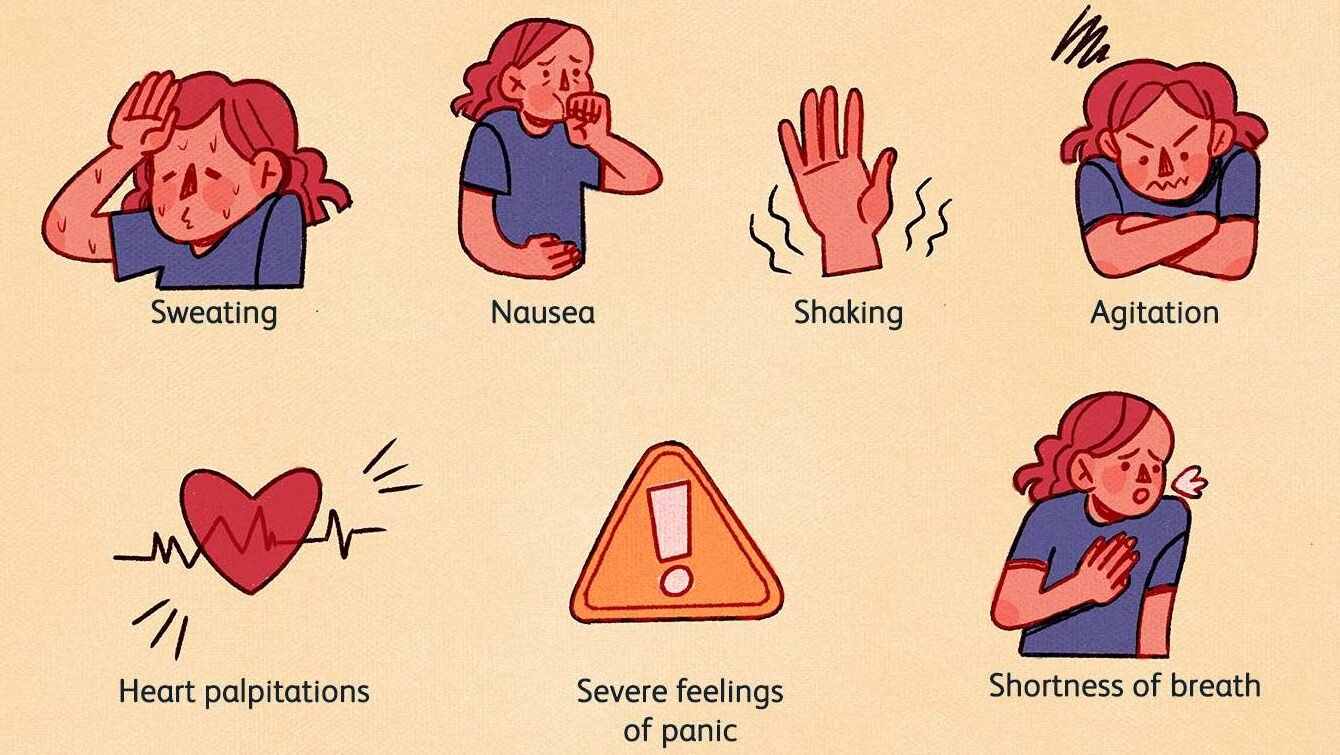
In an attempt to avoid this they struggle daily in their day to day life so that they do not get an attack in this situation or any other situation.
If you or someone you know or close to you gets panic attacks and you feel that the situation was a panic attack, then do not worry, all this is treatable.
Situations like panic attack also occur in some mental illnesses.
Before treating panic attack it is very important that we rule out all the reasons that present like panic attack.
Social anxiety disorder
We also call this social phobia. In this the victim feels very scared to interact in society or with other people. He also fears that people will come to know that I am feeling scared.
Or some other person in front of me will come to know that I am having anxiety and he will join me. Because of this he feels more afraid and this fear becomes so intense that he starts going out and meeting people.

And if he is meeting people somewhere then he keeps his talk, he gets irritated with all these things and slowly he starts living alone.
This disease / disorder is also treatable. For this also if you are facing any such situation then you do not have to worry.
SOCIAL ANXIETY DISORDER: ALSO CALLED SOCIAL PHOBIA, IS A LONG-TERM AND OVERWHELMING FEAR OF SOCIAL SITUATIONS. IT’S A COMMON PROBLEM THAT USUALLY STARTS DURING A TEENAGE YEARS
Treatment – Anxiety Disorder
One good thing is, all these anxiety disorders are treatable. You have to take medical help from the right place. You have to meet a Psychiatrist, you have to get yourself examined.
There are 2 things in treatment.
1. Medicines
which we call anti anxiety medications.
2. Psycho therapy/ Behavioral Therapy
This includes CBT (cognitive behavioral therapy)
CBT
What are these behavioral therapies?
These are the top therapies. In these, you are taught how to deal with your fear, stress, anxiety?
They teach you how to modify your thinking?
If such a scenario comes in front of you, what do you have to think?
Then how do you have to behave accordingly?
And how do you have to overcome your fear?
In this, you are also taught exposure therapy, you are prepared to face your fear in small graded amounts, and learn how to behave in it.
If there is something like this, then please definitely take psychotherapy or cognitive behaviour therapy.
You must talk to your psychiatric about what are these therapies?
And where do you get them from? And how are they taken?
Cognitive behaviour therapies have the same role in treating anxiety disorder as medicines.
Meaning, both (CBT and medicines) have equal role. It is possible that you may not need medicines and you may get better with just behavioral therapy.
CBT: IS A TYPE OF PSYCHOTHERAPEUTIC TREATMENT THAT HELPS PEOPLE LEARN HOW TO IDENTIFY AND CHANGE DESTRUCTIVE AND DISTURBINGTHOUGHT PATTERNS THAT HAVE A NEGATIVE INFLUNCE ON BEHAVIOUR AND EMOTIONS
SELF HELP IN ANXIETY DISORDER
What can you do for yourself, how can you help yourself, in all these situations?
Anxiety is an excessive response of our brain to a scenario in which our brain did not need to respond so much.
Now we can say that anxiety is an over reaction of our brain to even a small thing. You have to reduce this over reaction.
You should involve yourself in some good activity which gives you happiness, which is your hobby. You should listen to music, music has a very good role in keeping our brain calm and curing our anxiety disorder.
You should try to listen to slow beat music so that you get relaxation. You should definitely exercise. Because studies say that exercise is very beneficial for our mental health.
The more you are physically active, the more your body will release happy hormones. Which will reduce anxiety and depression. Mental disorders are very common, many people suffer from them. Please talk about it openly.
Do you feel that I will hide it, or if people judge me, what will I say? Do not think like this at all, everyone is suffering from some disorder in their life.
So all of us being human beings, we understand each other, so you please tell me openly that I have such a disorder that I get worried so that your colleagues, family members understand you.
And you got help in overcoming your fear.
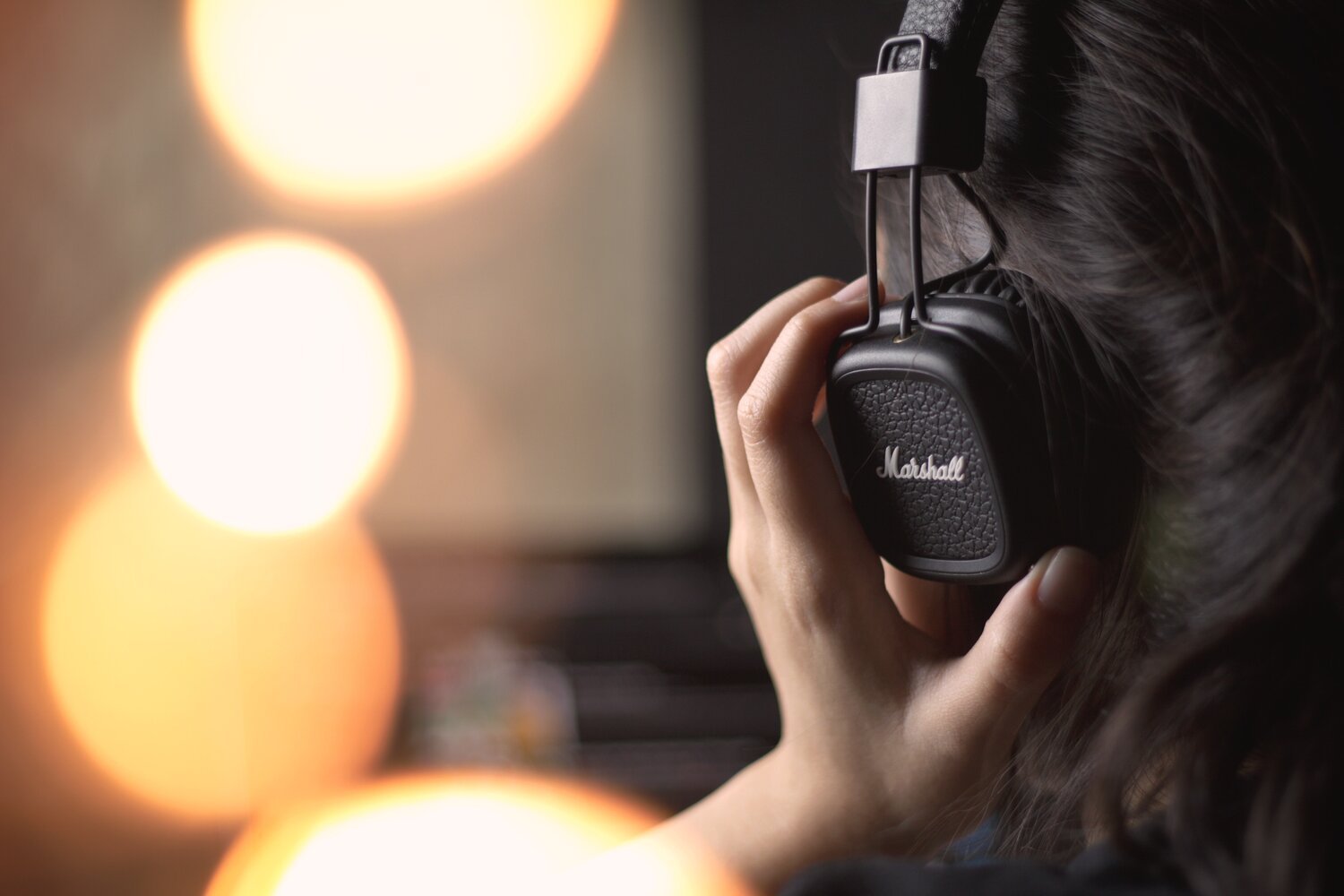

Apart from this, stay away from some things.
- If possible, reduce your coffee consumption.
- If you smoke, then stop smoking.
- Any thing which gives you stress or which makes you feel tense, you should avoid all those things, stay away from them.
- If you meet the doctor, do talk about psychotherapy/ cognitive behaviour therapy, as it is as effective as medications.
Please keep in mind that you are not the only one, there are many people, many populations who are suffering from stress, anxiety, mental disorder in some way or the other.
You can also join support groups. Meet people who are dealing with such scenarios/ such things, talk to them, so that your understanding for each other grows and you do not hesitate at all in meeting the doctor.
Because it is very important for your life to be peaceful, satisfactory.
If you keep thinking that someone will come to know that I have this disease, what will these people say about me in my childhood, then you will always keep suffering inside.
Come above all these things, social stigma, taboos, meet a doctor, try to live a healthy, happy and peaceful life.